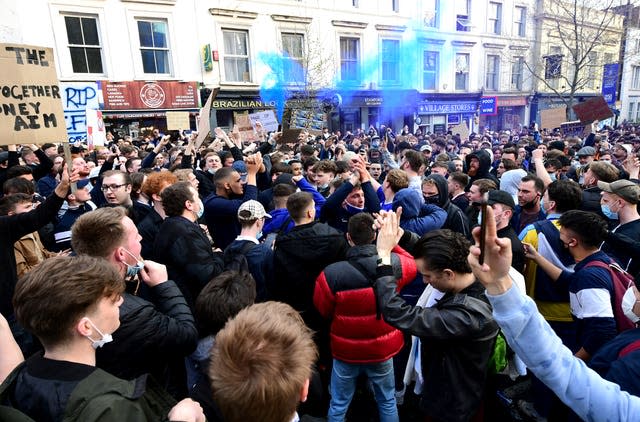A decision in the European Super League case, which could shape the future of the continent’s club football for years to come, is expected to be delivered on Thursday.
The Grand Chamber of the European Court of Justice must decide whether UEFA and FIFA acted against competition law by blocking the formation of the European Super League in 2021 and then look to sanction the clubs involved.
A non-binding decision by the Advocate General in the case last December found that rules allowing UEFA to obtain prior approval for new competitions were compatible with EU law.
The original Super League 2021 proposal was criticized for its ‘closed’ format, with 15 clubs set to be exempt from relegation.
A22, a company formed to help create that competition, has now drawn up revised plans for a multi-division event of between 60 and 80 teams, which it insists will, crucially, be open to all.
The company will be hoping the judgment will force sports federations such as UEFA to use non-discriminatory criteria when assessing new market entrants, opening the door for A22 to try again.
“Tomorrow is UEFA Judgment Day,” read an A22 post published on X on Wednesday.
“After nearly 70 years as the sole regulator, gatekeeper and dominant commercial operator of the European football market, UEFA’s monopoly may be coming to an end! We are on the threshold of a new and better era for #EuropeanClubFootball.”
There are many obstacles in the path of the A22 even if the judgment indicates that it has the right to stage a new competition under the auspices of UEFA, and that UEFA would have the right to consider that competition fully and fairly.
Crucially, is there a will from any club outside of the original architects of Real Madrid and Barcelona to join?
In September, the European Club Association, which has 500 clubs as members or within its network, signed a joint Memorandum of Understanding with UEFA which runs until July 2030.
Within the MoU there is a commitment that the ECA “ensures that none of its club members participates in any competition that is not organized or recognized by UEFA or FIFA”.
A22’s claim that UEFA is the dominant commercial operator is at least challenged by the existence of the Joint Venture between UEFA and ECA which oversees all marketing and commercial matters relating to the Champions League and other club competitions. UEFA. Each organization has seven members on the JV board.
In England, the Premier League has just announced a new home TV rights deal worth £6.7 billion. If there is any danger that the A22 competition suggests could kill or even harm that golden goose, it is hard to picture any English club supporting it.
Clubs are also banned from taking part in unsanctioned competitions as a condition of license to be decided by England’s independent game regulator, and the Premier League Owners’ Charter agreed in 2022 also contains commitments not to “participate in the creation of new competition formats. outside Premier League rules”.
In France, it has been reported that there is a compensation clause in the home game investment from CVC if a French club participates in any Super League, while German club ownership structures provide a major barrier.
That’s all before considering another crucial element – the fans.
England supporters took to the streets despite coronavirus restrictions when the initial Super League plans became known, and played a key role in its collapse.

Fans of Bayern Munich and Borussia Dortmund have also put up strong opposition in the past.
Karl-Heinz Rummenigge, a member of Bayern’s supervisory board and former ECA chairman, issued some scathing comments about Super League in an interview with Italian news outlet Gazzetta dello Sport on Wednesday.
Asked what would happen if the ECJ authorized the Super League as a whole, Rummenigge said: “It wouldn’t go far. Thirty years ago the system would have resisted the novelty, now it is different.
“The English, the Germans and the French would never participate. I also believe that the Italians and the Spanish would not (would not), unless there is some president who thinks to go to bed and wake up the next day covered in gold.”
The interpretation of the Grand Chamber’s judgment on EU law will be returned to a commercial court in Madrid for a decision, after the Spanish jurisdiction makes the referral in 2021.
That court also overruled sanctions imposed by UEFA on the nine clubs that joined the Super League but later withdrew. It remains to be seen whether UEFA will continue with those sanctions and whether it may investigate more serious charges against Real and Barcelona.